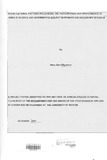| dc.description.abstract | This study mainly focused on socio-cultural factors influencing the participation and
performance of girls in science and mathematics subjects at primary and secondary
levels. These are the subject areas where differences in participation and performance
between girls and boys are the most obvious.
The study specifically sought to find out if parents', teachers' and students attitudes
influence the participation and performance of girls in these subjects. It also sought to find
out if the educational materials especially text books are gender biased and if so, how
they influence the participation and performance of girls in science and mathematics.
This study was based on secondary data.
f· -c,
The study revealed that parental attitudes determine which child goes to school and which
one is given moral and financial support to p
his study revealed that textbooks, particularly science textbooks are gender biased and in
favour of boys and men. They portray women in their nurturing and passive roles in
relation to men and have failed to give recognition to women scientists. They misrepresent
the world and act to reinforce gender stereotyping patterns. They are imaging forming,
shape attitudes and act as socializing agents in terms of knowledge about people and
their relationships, over and above that of pure academic and technical knowledge about
these subjects. When girls use such text books they fail to be encouraged to participate
and perform well in science and mathematics subjects.
In schools, there are fewer female teachers than males in science and mathematics
subjects especially in higher primary classes and in secondary schools. Hence the girls
lack role models to identify with. The fact that more m~le teachers teach science and
mathematics only helps to prove that sciehce and mathematics ~re masculine subjects. . '- Lack of role models negatively influence the participation and performance of girls in
science and mathematics.
The study revealed that parents, teachers, boys and girls themselves have a negative l ',
attitude towards girls participation and performance in science and mathematics subjects.
Lack of role models and gender biased textbooks also negatively influence the attitudes of
girls towards these subjects. | en |

